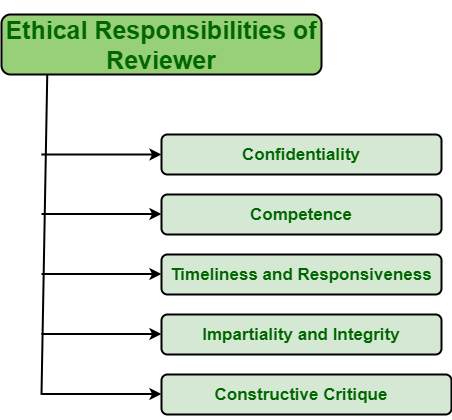Ethical Responsibilities of Reviewer
Last Updated :
03 Sep, 2020
Peer review basically defined as the evaluation of work that is done by one or more people with similar competencies as producers of work. It is a very critical tool for simply ensuring software quality. Peer reviewers generally play a central and very critical part in the peer-review process.
There are several ethical responsibilities of peer reviewer while conducting a review as given below :

These are explained as following below.
- Confidentiality :
The main principle of confidentiality is to maintain privacy. It is basically defined as a state of keeping something private or secret. Reviewer also has main responsibility to keep documents private and secret that is under review. To keep private means not to share or discuss with anyone outside review process unless it is necessary and approved by editor.
- Competence :
Competence is basically described as quality or state of having sufficient knowledge, required skill, qualification, strength. For review process, reviewers should only accept review if he/she has knowledge, expert, and required skill for reviewing particular material.
If reviewer is not expert regarding material then there is possibility of substantial deficiencies or rejection of material. Therefore, reviewer should not accept review in such cases.
- Timeliness and responsiveness :
Timeliness simply means quality of doing something at a favorable or best time whereas responsiveness simply means quality of reacting quickly and positively. Reviewers are also responsible for reviewing material quickly in time requested and submit it in a given period of time.
Reviewer needs to put every possible effort to complete review in a positive manner withing time requested. If reviewer cannot complete review in time requested, then he/she should not accept review in such cases.
- Impartiality and Integrity :
Impartiality simply means fairness in decisions, feedback. Reviewer also has responsibility to provide impartial i.e., unbiased and constructive feedback in a timely manner. They are also responsible ensure that feedback has adequate i.e. acceptable detail. They should not take advantage of material through communication of peer review.
- Constructive critique :
Constructive is basically a process where individual expresses his/her opinion about a particular thing whether positive or negative aspects are there in a pleasant manner.
Reviewers are also responsible for giving positive aspects of material that is under review, identify or determine negative aspects constructively if present. This feedback should be provided so that improvement can be done if needed. Author resolve and fix all weakness in work. Improvement strategies are implemented that are required to fix issues after getting feedback.
Like Article
Suggest improvement
Share your thoughts in the comments
Please Login to comment...